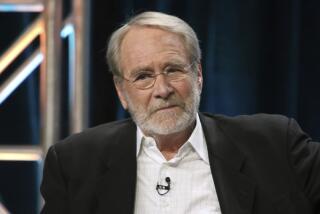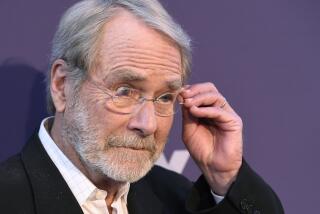Patricia Neal dies at 84; Oscar-winning actress found triumphs in a life of tragedies
Her life was marked by professional triumphs, including a Tony Award-winning debut on Broadway in Lillian Hellman’s 1946 drama “Another Part of the Forest” and a best actress Oscar for her role in the 1963 drama “Hud.”
But for Patricia Neal, the husky-voiced actress with a strong screen presence, life also was marked by personal tragedies: the death of one of her children and brain damage to another, and her own battle to overcome the debilitating effects of a ruptured aneurysm in her brain in 1965 that temporarily halted her career.
“Frequently my life has been likened to a Greek tragedy, and the actress in me cannot deny that comparison,” Neal wrote in her 1988 autobiography, “As I Am.”
Neal, 84, died of lung cancer Sunday at her home in Edgartown, Mass., on Martha’s Vineyard. But in the end, she told family members who had gathered around her the night before: “I’ve had a lovely time.”
Neal’s daughter Ophelia Dahl said her mother, who was divorced from British writer Roald Dahl and once had an affair with married actor Gary Cooper, “recognized the extraordinary opportunities she had, and she also recognized that she was dealt a bad hand at times.”
“The thing about my mother, it would seem she was really able to make the most of when times were good, and she’d find things to be positive about,” Dahl told The Times on Monday.
After her Tony Award for best featured actress in a play for “Another Part of the Forest,” Neal was signed to a contract with Warner Bros., where she was cast in “John Loves Mary,” a 1949 comedy starring Ronald Reagan and Jack Carson.
She went on to appear in a string of films and live TV productions over the next decade, including the 1949 film adaptation of Ayn Rand’s novel “The Fountainhead” (co-starring Cooper), the 1951 science fiction classic “The Day the Earth Stood Still” and director Elia Kazan’s 1957 drama “A Face in the Crowd.”
“There was a directness and honesty to her approach to acting that was kind of inspiring,” movie historian Richard Schickel told The Times on Monday. “As a young actress, she had kind of a quiet ferocity. She was a woman of great quality and emotionally very truthful.”
Neal’s Oscar-winning role as the weary housekeeper in “Hud,” starring Paul Newman as the ruthless son of a Texas rancher, came in the wake of two family tragedies.
In 1960, her infant son Theo sustained neurological damage when the carriage his nurse was pushing was crushed between a taxi and a bus in New York City. And two years later, Neal’s 7-year-old daughter Olivia died of encephalitis as a result of measles.
Then in 1965, a year after winning her Oscar, the 39-year-old Neal suffered a ruptured aneurysm in the brain, followed by two more bleedings after arriving at UCLA Medical Center, where she underwent a seven-hour operation.
Neal, who was pregnant at the time, was in a coma for more than two weeks and on the critical list for three.
When she finally was allowed to return to the home she and her husband were renting, her entire right side was paralyzed and she was partially blind, had no memory and could not speak.
But Dahl, who had stayed by her side at the hospital, called her “a tremendous fighter.”
At her husband’s insistence after returning to England three months later, Neal underwent extended therapy, including swimming, walking, memory games and crossword puzzles.
“I loathed life when I first went back to England,” Neal later said. “I had exercises to do every day. My husband had people coming in to teach me — three a day. I wanted to commit suicide, but I didn’t know how.”
But late in November 1966, on a day she remembered clearly from then on, she suddenly “wanted to live again.” She said, “When I ‘woke up’ and had been ill for 18 months, I began to like life again.”
In March 1967, Neal made her first real public appearance since she was stricken. At the insistence of her husband, she spoke to 2,000 people in New York City at a benefit for the New York Assn. for Brain Injured Children.
In that speech, she told of the friends who, with incredible patience, had struggled to turn “a complete idiot ... an enormous pink cabbage ... “ into a human being again.
And she gave most of the credit to Dahl: “My husband is a great man. I love him.”
In her autobiography, however, Neal wrote that she did not love Dahl when she married him but that she admired him and wanted children. As the New York audience applauded her speech, she wrote later in her book, “ ... I knew at that moment that Roald the slave driver, Roald the bastard, with his relentless scourge, Roald the Rotten, as I had called him more than once, had thrown me back into the deep water. Where I belonged.”
Her husband also pushed her into appearing at the 1967 Academy Awards ceremony to present the award for best foreign film. As she did after her New York speech, she received a standing ovation.
Neal returned to the big screen in the 1968 drama “The Subject Was Roses,” with Jack Albertson and Martin Sheen. Her portrayal of the mother of a returning World War II soldier who must come to terms with his parents’ troubled marriage earned her an Oscar nomination.
Calling Neal’s return to the screen “triumphant,” The Times’ movie critic Charles Champlin noted that “what seem the only faint traces of her physical troubles — a slight and occasional deliberateness in movement and speech — meld credibly into the portrayal.”
Neal went on to receive an Emmy nomination playing Olivia Walton in the 1971 made-for-TV film “The Homecoming: A Christmas Story.” She also earned Emmy nominations for her roles in the 1977 drama “Tail Gunner Joe” and the 1979 Hallmark Hall of Fame production of “All Quiet on the Western Front.”
Among her later credits is the 1999 Robert Altman film “Cookie’s Fortune.”
She was born Patsy Louise Neal on Jan. 20, 1926, in a Packard, Ky., mining camp where her father was transportation manager for a coal company. In Knoxville, Tenn., where the family moved while she was in grammar school, she was precocious and showed talent in reciting monologues at church gatherings.
Her parents encouraged her, and she received dramatic coaching at 12. She performed with the Tennessee Valley Players and studied drama at Northwestern University.
After two years there, Neal went to New York, arriving in 1945 with $60 and a burning ambition.
Playwright Eugene O’Neill took an interest in her, and that led to her being hired by the Theatre Guild to appear in the summer tryout of a play in Westport, Conn. There, she was seen by Lillian Hellman, who wanted her for “Another Part of the Forest.”
After signing with Warner Bros., Neal made 13 movies in three years, including the 1950 drama “Bright Leaf,” her second film with Cooper, and the 1951 war drama “Operation Pacific,” opposite John Wayne.
But her unhappiness with Hollywood was growing, in part because of her futile romance with Cooper.
“He was married,” she pointed out 30 years later, “and declined to leave his wife. And rightly so.” Some published accounts suggested that the affair, during which she had an abortion, led her to a nervous breakdown.
Having been suspended by Warner Bros. for refusing to star in a western with Randolph Scott, Neal decided to leave Hollywood.
She returned to New York where, in December 1952 she opened in a revival of “The Children’s Hour.” She then played off Broadway in “School for Scandal.”
In 1953, she married Dahl, an RAF flier who had been shot down early in World War II and assigned to a post in Washington, D.C., where he began writing short stories.
After their marriage, they bought a home in England but spent part of their time in New York.
As Neal rebuilt her career, she played in Broadway in “A Roomful of Roses,” was associated with the Actors Studio and was chosen by Elia Kazan to fill in for Barbara Bel Geddes in “Cat on a Hot Tin Roof.”
She also scored a film success in “A Face in the Crowd” with Andy Griffith. In 1960, she had a supporting role in the film “Breakfast at Tiffany’s.”
After winning the Oscar for “Hud,” Neal said: “It’s strange to find myself suddenly in demand again. My professional life in the last few years falls into two sections, pre-’Hud’ and post-’Hud.’ I’m not a very ambitious woman, and had been very happy just living with my family in the country, perhaps making a film every couple of years.”
Neal and Dahl were divorced in the early 1980s after she discovered he was having an affair with one of her best friends. He died in 1990.
In addition to her daughter Ophelia, Neal is survived by her other children, Tessa, Theo, and Lucy Dahl; her sister, Margaret Ann VandeNoord; her brother, William “Pete” Neal; 10 grandchildren and step-grandchildren; and a great-grandchild.
Neal, who became an advocate for stroke victims, was actively involved with the Patricia Neal Rehabilitation Center in Knoxville since it began in 1978.
In 1984, Neal confided to a profile writer that she was tired of being told she was brave, courageous and plucky. She was, she said, just someone who had absorbed more than her share of rotten luck.
Asked by a reporter for the New Orleans Times-Picayune in 2002 why she thought she survived all that she had in her life, Neal responded: “God knows why. I don’t.
“All I know is that I have always been determined to do my best. Have you noticed that I rarely play weak women? Part of that’s my voice; it fools people. But part of it, I think, must be me.”
Times staff writer Valerie J. Nelson and former Times staff writer Jack Jones contributed to this report.
More to Read
Start your day right
Sign up for Essential California for the L.A. Times biggest news, features and recommendations in your inbox six days a week.
You may occasionally receive promotional content from the Los Angeles Times.






